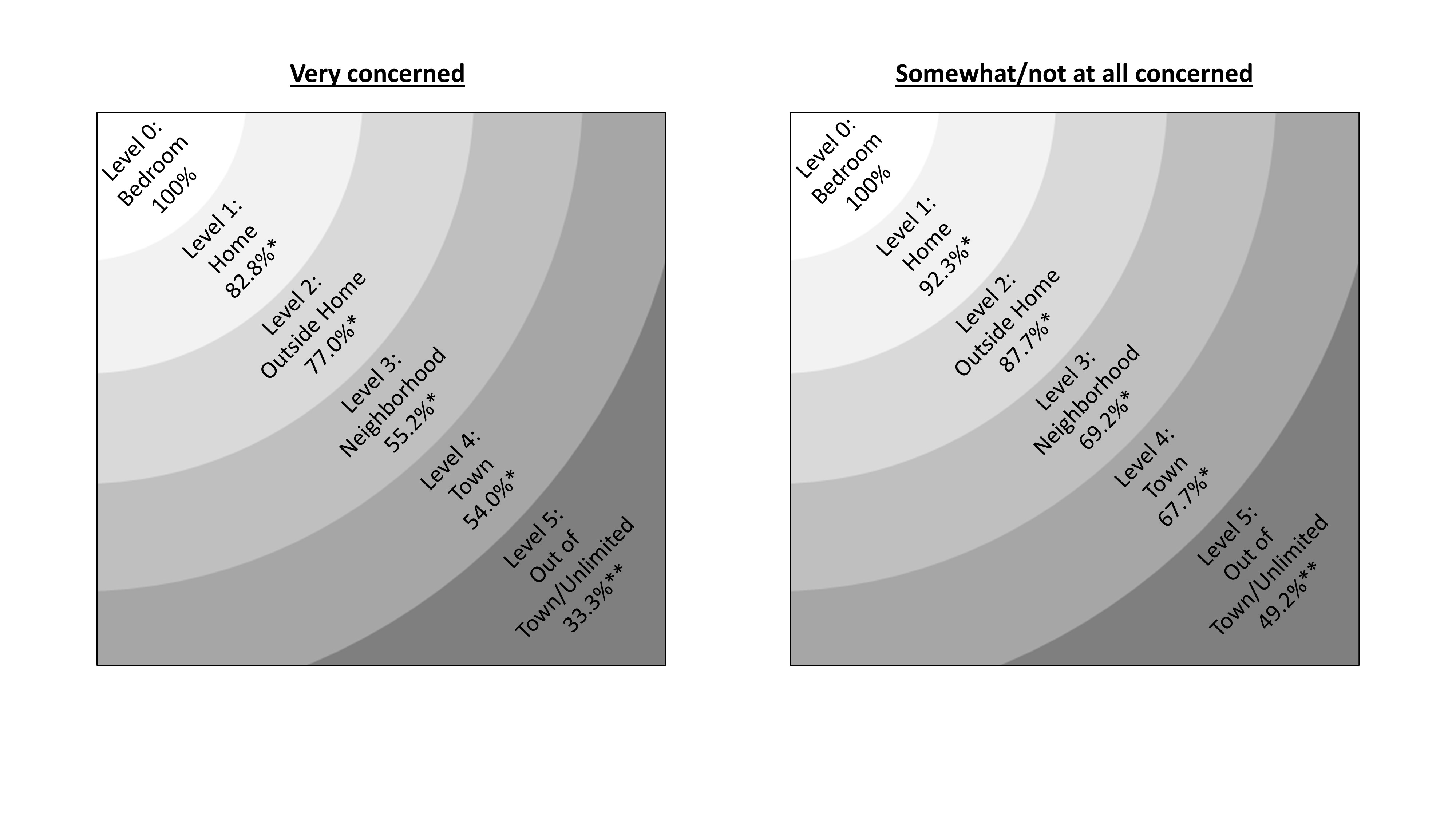Session Information
Date: Tuesday, November 9, 2021
Title: Patient Outcomes, Preferences, & Attitudes Poster IV: COVID-19 (1589–1613)
Session Type: Poster Session D
Session Time: 8:30AM-10:30AM
Background/Purpose: Opportunities for community mobility, which reflects both physical mobility and social participation, during the COVID-19 pandemic have been limited and may have been related to level of concern about the pandemic. We used data from an ancillary cohort study [Approaches to Positive, Patient-centered Experiences of Aging in Lupus (APPEAL)] to examine the association between level of concern about the pandemic and community mobility among individuals with systemic lupus erythematosus (SLE).
Methods: APPEAL subjects were recruited from the population-based Georgians Organized Against Lupus (GOAL) cohort of individuals with validated SLE. A total of 153 participants (mean age, 48 years; 95% female, 76% Black) were consented (10/6/2020-5/4/2021) for a single visit during the period the COVID-19 survey was administered. Responses to the item “How concerned are you about the COVID-19 pandemic?” (N=152) were dichotomized as very concerned vs. somewhat or not at all concerned. Community mobility was measured via the UAB Study of Aging Life-Space Assessment (score range, 0-120), with higher life-space scores representing greater community mobility (movement across greater distances from home, with greater frequency and less help). Scores were described overall and by level of concern [medians (interquartile ranges)], and Wilcoxon rank sum tests were used to obtain p values. The percentages of participants reaching each life-space level without personal assistance were calculated and compared by level of concern using chi-square tests. Finally, life-space scores were dichotomized as low (at or below the median, ≤48) vs. high (above the median, >48) in logistic models with concern as the exposure, adjusting for age, gender, and race.
Results: Life-space scores were lower among participants who were very vs. somewhat/not at all concerned about the pandemic [35 (16-72) vs. 58 (24-72); p = 0.2]. Overall, without personal assistance, 86.9% of participants reached the life-space level of home (excluding bedroom); 81.7%, outside the home; 61.4%, neighborhood; 60.1%, town; and 40.5% out of town/unlimited. Percentages of patients reaching each life-space level without personal assistance were lower among those who were very concerned about the pandemic, compared to those who were somewhat/not all concerned (Figure). Those who were very vs. somewhat/not at all concerned were 68% more likely to have a low vs. high life-space score [OR=1.68 (95% CI 0.79-3.21)]; adjustment for demographics slightly attenuated this association [OR=1.54 (95% CI 0.79-3.00)]. The associations were similar among older [≥50 years; OR=1.61 (95% CI 0.62-4.17)] and younger [< 50 years; OR=1.73 (95% CI 0.71-4.21); p-interaction=0.8] patients. Most of the differences and associations were not statistically significant.
Conclusion: In this cross-sectional study of individuals with SLE, we found that life-space scores were low overall and that these scores were even lower among those who expressed high level of concern about the COVID-19 pandemic. Future studies should explore whether these low levels of community mobility persist beyond the pandemic and whether they are associated with poor physical and/or mental health outcomes in SLE.
 Percentages of SLE patients reaching life-space levels without personal assistance, by level of concern about the COVID_19 pandemic (very concerned vs. somewhat/not at all concerned). *p < 0.1; **p < 0.05.
Percentages of SLE patients reaching life-space levels without personal assistance, by level of concern about the COVID_19 pandemic (very concerned vs. somewhat/not at all concerned). *p < 0.1; **p < 0.05.
To cite this abstract in AMA style:
Plantinga L, Hoge C, Drenkard C, Dunlop-Thomas C, Pearce B, Lim S, Bowling C. Concern About the COVID-19 Pandemic and Community Mobility Among Systemic Lupus Erythematosus Patients [abstract]. Arthritis Rheumatol. 2021; 73 (suppl 9). https://acrabstracts.org/abstract/concern-about-the-covid-19-pandemic-and-community-mobility-among-systemic-lupus-erythematosus-patients/. Accessed .« Back to ACR Convergence 2021
ACR Meeting Abstracts - https://acrabstracts.org/abstract/concern-about-the-covid-19-pandemic-and-community-mobility-among-systemic-lupus-erythematosus-patients/
